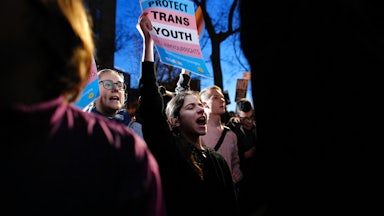In mid-March, Stella Keating, a 16-year-old rising junior from Tacoma, Washington, addressed a Senate Judiciary Committee hearing, detailing her life as a trans teen and student. Stella told the committee about her interest in politics, getting ready for college, and her work with the GenderCool project. She described her loving, supportive family, who raised her with a desire to be of service to others. Then she started talking about the future, how the United States currently only offers a hodgepodge of state laws protecting students like her. “What happens if I want to attend a college in a state that doesn’t protect me?” she asked her senators.
The hearing was held to discuss the Equality Act, which would modernize the Civil Rights Act of 1964 and add sexual orientation and gender identity to existing federal nondiscrimination law that already protects people on the basis of sex, religion, and race. It was also the last action that the Senate has taken on the bill, which has been languishing in the chamber since the House passed its version in late February.
The story of the Equality Act is a familiar one. Nearly the entire federal Democratic caucus has endorsed the bill, and President Joe Biden promised during his campaign to pass the Equality Act within his first 100 days, a deadline that has long since come and gone.
LGBTQ people have been waiting for decades for federal nondiscrimination protections. While 29 states have outlawed some form of discrimination against LGBTQ people and the Supreme Court banned LGBTQ employment discrimination in Bostock v. Clayton County last year, it’s still legal in 21 states to discriminate in other aspects of life, like in education and public accommodations. A person’s rights shift—strengthened, then made vulnerable—with simple geography, the crossing of state lines.
Nothing here is theoretical. The problem of discrimination against trans people is still pervasive, something people live with on a daily basis. According to the 2016 National Transgender Survey, 33 percent of trans people in the U.S. had experienced discrimination from a health care provider in the previous year. Fifty-four percent of out trans students reported being verbally abused at school, and 24 percent reported physical abuse at school.
The uncertainty around the Equality Act is not the first instance of LGBTQ equality legislation being left to languish in Congress. Most bills never get a vote in the chamber they’re introduced in, and if they do, thin Democratic majorities are left to bargain down their scope, usually at the expense of trans people. The Equality Act seems to be headed for the same fate, though it also represents the best chance, of late, for LGBTQ people to get the legal protections they’ve been looking for over the last several decades. It’s a fraught experience—seeing the potential and knowing how quickly it fades—that characterizes much of the limited progress we’ve seen on LGTBQ rights in recent decades.
The first piece of federal LGBTQ nondiscrimination legislation, the Employment Non-Discrimination Act, was introduced in 1994 by Representative Gerry Studds, a Democrat from Massachusetts, and Senator Ted Kennedy. Efforts were made to pass the legislation in 1995, 1996, 1997, and 1999, with each attempt thwarted. It wasn’t until ENDA passed the House in 2007 that an LGBTQ equality bill passed through a federal chamber. Another attempt at passing it failed again in 2013. The Equality Act first passed the House after Democrats retook control of the chamber in 2018, but the legislation was, unsurprisingly, squashed in the Senate by former Senate Majority Leader Mitch McConnell.
The delay has left LGBTQ advocates and even some Democratic House members frustrated. Representative Marie Newman, who has a 20-year-old trans daughter, recently told me in an interview for Teen Vogue that though she expects a vote on the bill to come within this calendar year, the delay has been unacceptable. “It is really frustrating,” Newman said. “I think there’s a chance it will pass, but that takes work.… I will ask everybody in America to continue to put pressure on their senators.”
While progress stalls at the federal level, policies targeting trans people have accelerated in the states. Since late 2015, religious conservatives and Republicans have largely shifted their focus away from attacking gay and lesbian rights toward focusing on trans rights. After failing to move the public needle with bathroom bills like North Carolina’s HB2, Republicans have moved on to thornier political questions over trans rights.
Arkansas and Tennessee have passed bills restricting trans-affirming care for trans minors, while nine states have banned trans girls from playing girls’ school sports. Overall, there have been over 250 anti-LGBTQ statehouse bills filed this year, according to the Human Rights Campaign, with 16 passing, making 2021 the most prolific year for anti-queer and anti-trans legislation in recent memory.
The Equality Act would go a long way toward fighting back against those bills, and strike a devastating political blow against anti-LGBTQ activist groups, such as the Heritage Foundation and the Alliance Defending Freedom, which have orchestrated the broad political attacks this year. The protections offered by the Equality Act would overturn the state-level trans athlete bans and would likely also overturn Arkansas’s medical ban, forcing conservatives to conceive of a new line of attack, or to overturn the law in the court system.
But it’s not just Republican obstinance at the federal level blocking these necessary interventions. Democrats equivocate on these issues all the time. With near-complete Republican opposition, Democrats would likely have to kill the filibuster to pass the Equality Act, and it’s unlikely that holdouts like Senators Joe Manchin and Kristen Sinema would reverse their opposition to dumping the filibuster just to help some trans kids in Arkansas.
In fact, Manchin himself is already on the record opposing the bill, in 2019, saying he had concerns about the “lack of clarity” on trans school bathroom access. Without Manchin’s vote, it’s not clear that Democrats have the 50 votes needed to pass the bill even after killing the filibuster. Republican Senator Susan Collins co-sponsored the bill during the last Congress, but she pulled her endorsement this year, blaming the Human Rights Campaign and other LGBTQ advocacy organizations for endorsing her 2020 election opponent, Sara Gideon.
It seems likely that the only way the Equality Act will pass the Senate is with major Democratic concessions. It’s unlikely that any Republican, or even Manchin, will support a bill with trans protections included. This could set up a rerun of the 2007 ENDA debate that nearly split the LGBTQ movement apart.
It’s a problem of the Democrats’ own making. By refusing to kill the filibuster, Democrats have forced themselves to have to bargain with unwilling Republicans on their entire legislative agenda, from infrastructure to the failed attempt at creating a January 6 commission, to the Equality Act. While Republicans have feigned willingness to pass protections for gay and lesbian Americans, few have been willing to go to bat for trans people. That would likely be the starting point on any potential compromise to win over Republican Senate votes.
Back during the debate on ENDA, Democrats controlled all three branches of the government, and LGBTQ advocates seized on the chance to try to pass federal employment nondiscrimination protections for LGBTQ people. Trying to win over Republican votes, some Democrats, including bill sponsor Barney Frank, decided to cut trans people out of the bill.
“To win this vote, we need to get the votes of people who beat Republican incumbents last year in districts that voted for George Bush, and we’re going to yell at them because they only vote to protect people from discrimination based on sexual orientation and are not yet ready to include transgender?” Frank said at the time.
The proposal forced LGBTQ organizations to take sides, with the Human Rights Campaign opting not to oppose the limited bill. Hundreds of other groups, including the American Civil Liberties Union and the Leadership Conference on Civil Rights, felt that solidarity with trans people outweighed the limited gains cis LGB people would gain from the limited bill, sending a letter to House Speaker Nancy Pelosi denouncing the trans-exclusive bill. “We ask you to keep working with us on an Employment Non-Discrimination Act that protects everyone in our community, and to oppose any substitute legislation that leaves some of us behind,” read the letter.
Despite the deep concessions, Republicans mustered enough opposition in the Senate to kill ENDA anyway. The bargaining had been poisonous to the movement but politically pointless. Democrats lost all the same. Last year’s Supreme Court decision in Bostock v. Clayton County essentially accomplished what ENDA sought, to protect LGBTQ people from discrimination in employment decisions. But the Equality Act would be a much more sweeping piece of legislation for LGBTQ people.
The ENDA debate and result offer potential lessons for Democrats trying to pass the Equality Act in 2021 and refuse concessions that would ultimately harm the people in most need of the law’s protection.
With Fox News and the right-wing press having spent months fomenting anti-trans sentiment among the conservative base, it’s unlikely that any Republicans would support the Equality Act in its current form. Republicans see this as a core culture-war issue, which they can use as a wedge issue for years to come. A trans-inclusive Equality Act would deal a serious blow to that agenda.
But trans people especially need the Equality Act now, and LGBTQ advocates know that. There won’t be much political appetite for a watered-down compromise that cuts trans people out of the bill. That likely leaves the bill dead in the chamber until Democrats can win enough seats, or muster the political courage, to kill the filibuster.
And that leaves the Equality Act in this perpetual holding pattern that so many pieces of LGBTQ legislation have found themselves in before. In America, we often tell ourselves that things get better over time. There’s even an LGBTQ advocacy campaign built explicitly around this message. But in Congress, things haven’t gotten better. Trans and queer people are still stuck in the same doom loop that previous equality legislation faced over the last several decades, being told the same stories about patience and compromise, while outside the tranquil chambers of Congress, the situation only grows more dire.








